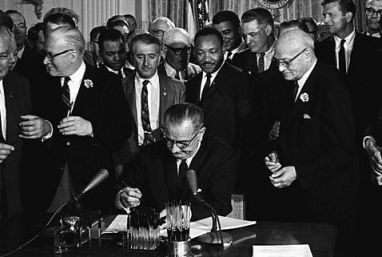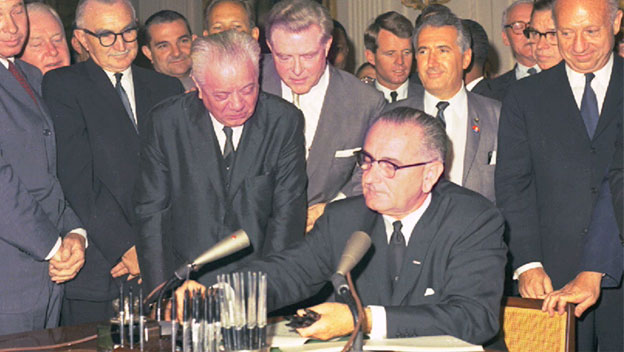Civil Rights Acts (1964, 1968)
The Civil Rights Act of 1964 is labor law legislation that outlawed discrimination based on race, color, religion, sex, or national origin. It ended unequal application of voter registration requirements and racial segregation in schools, at the workplace and by facilities that served the general public (public accommodations). Initially, the powers given to enforce the act were weak, but they were supplemented in later years. Congress asserted its authority to legislate via several different parts of the Constitution, principally its power to regulate interstate commerce, its duty to guarantee all citizens equal protection of the laws through the 14th Amendment, and its duty to protect voting rights under the 15th Amendment.
In response to a campaign against fair housing discrimination, President Johnson urged the passage of The Fair Housing Act of 1968, one week after the assassination of Martin Luther King, Jr. Its primary prohibition makes it unlawful to refuse to sell, rent to, or negotiate with any person because of that person's inclusion in a protected class. The goal is a unitary housing market in which a person's background (as opposed to financial resources) does not arbitrarily restrict access. Calls for open housing were issued early in the twentieth century, but it was not until after World War II that concerted efforts to achieve it were undertaken. While the act stopped some of the more egregious instances of housing discrimination, it should be noted that the nation is far from fair when it comes to one's ability to obtain housing. Race is still an issue and has been despite the efforts made through the acts listed here.
Notable Supreme Court Cases:
- Regents of the University of California v. Bakke, 438 U.S. 265 (1978) - in this case, the court upheld affirmative action, allowing that race could be one of several factors to consider in college admission policy. However, the court struck down specific racial quotas as impermissible.
- Texas Dept. of Housing and Community Affairs v. Inclusive Communities Project, Inc., 576 U.S. ___ (2015) - this case held that disparate impact claims were intended to be a part of the Fair Housing Act but that a plaintiff must prove that it is a defendant's policies that have caused the disparity.
Selected Library Resources:
- Robert D. Loevy, ed., The Civil Rights Act of 1964: The Passage of the Law that Ended Racial Segregation, KF4757 .C59 1997
- June Manning Thomas and Marsha Ritzdorf, eds., Urban Planning and the African American Community: In the Shadows, HT167 .U7277 1997 (available from the Founders Library Auxiliary Collection)
- Bernard Grofman, ed., Legacies of the 1964 Civil Rights Act, KF4757 .L44 2000 (available from the Founders Library Auxiliary Collection)
- David C. Carter, The Music has Gone Out of the Movement: Civil Rights and the Johnson Administration, 1965-1968, E185.615 .C3517 2009 (available from the Founders Library Auxiliary Collection)